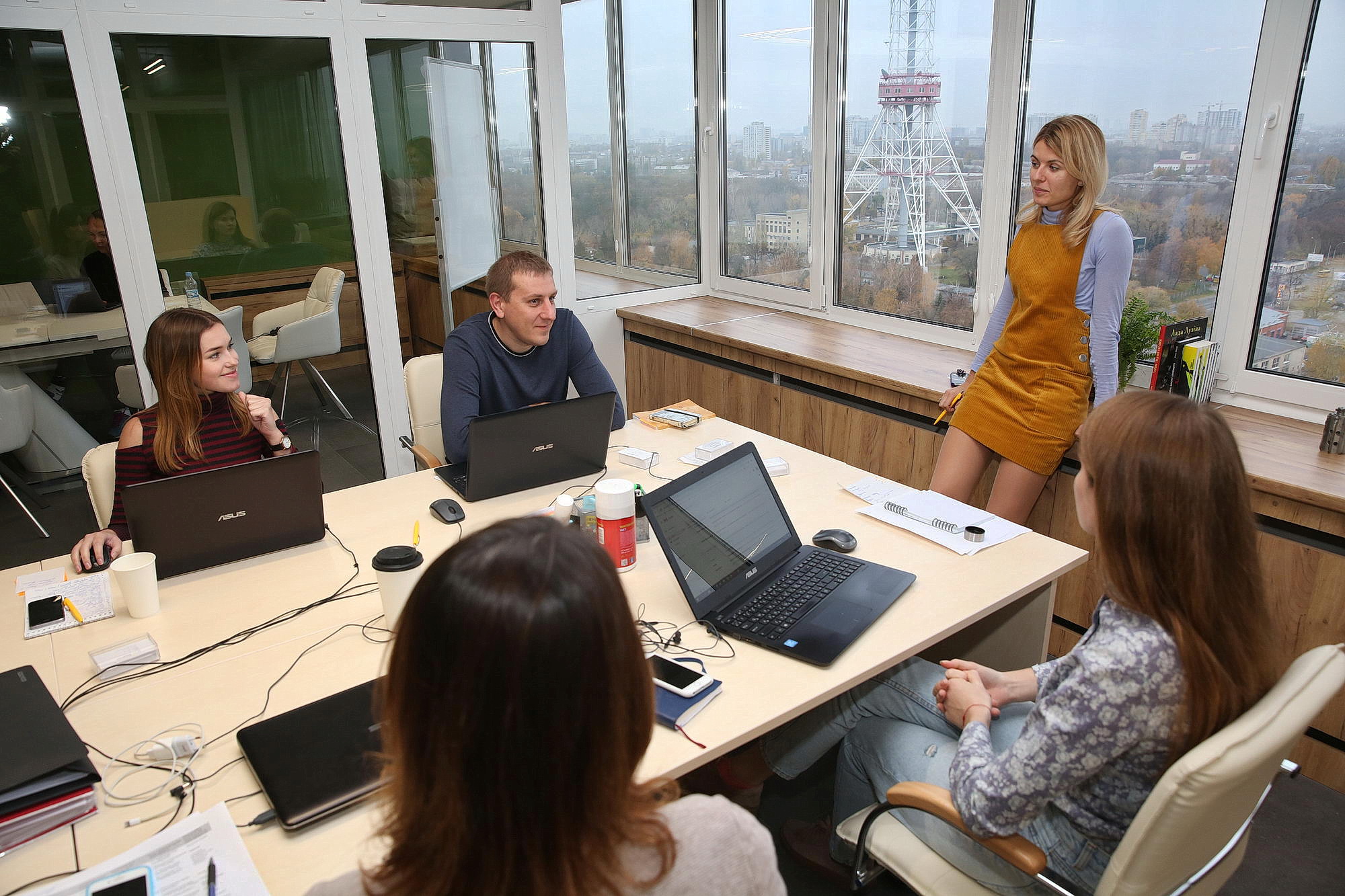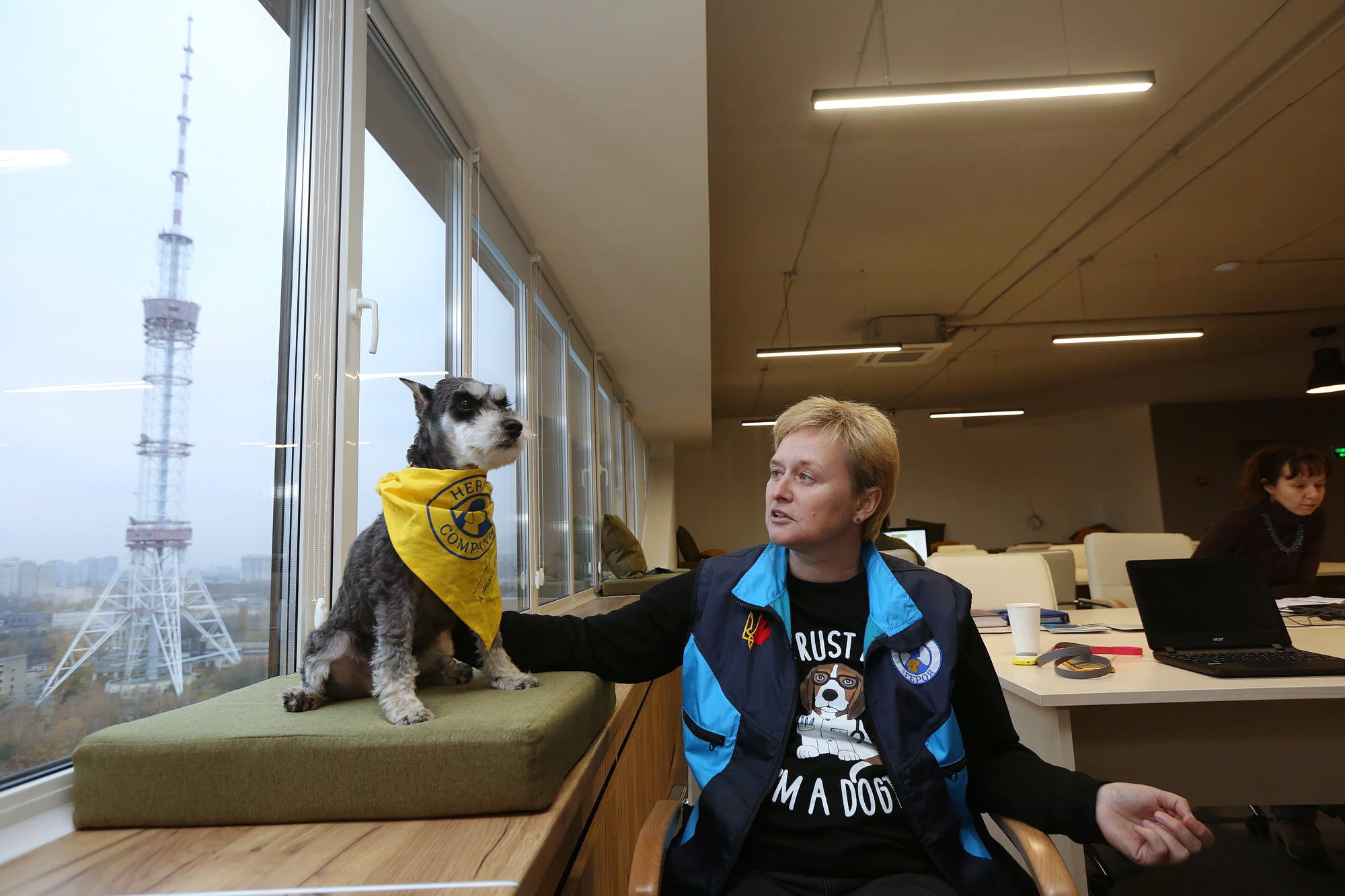Ukrainian war veterans will now find it easier to get legal assistance, employment help, and psychological support — all at one convenient spot in Kyiv.
The new organization Veteran Hub, which opened in the Ukrainian capital on Nov. 2, combines the services of eight nonprofits in one spacious office, allowing veterans in need to economize time and effort.
Ivona Kostyna, the co-founder of Veteran Hub, says that she hopes that the non-profits will communicate with each other and work together on common projects.
“I believe that it’s the only way to actually develop activities connected to veterans in Ukraine,” she told the Kyiv Post.
According to the state service for war veterans, there are almost 23,000 veterans living in Kyiv, but no center offering services like the Veteran Hub. Apart from war veterans, the center will also provide free help to soldiers, law enforcement officers, first responders, their families and the family members of deceased soldiers.
The need for help has become acute since Russia launched its ongoing war against Ukraine in 2014, killing more than 10,500 people, including 2,800 soldiers.
Located inside the Kyiv Telecenter that also houses the UA Pershyi television channel, Veteran Hub is funded by the foundations of Ukrainian philanthropists Viktor and Elena Pinchuk.
The co-founders of Veteran Hub, Kostyna and Artem Denysov, also head a non-profit organization called Pobratymy, which translates to Brothers in Arms in English and provides social and psychological support to veterans who are adapting to civilian life.
The co-founders say that nongovernmental organizations in Ukraine like theirs are mostly funded by grants and when their grant projects are over, they find it difficult to carry on while they look for new financing.
“That’s why we decided to find financing and create an administrative platform, a large common hub for NGOs, to cover their primary operating expenses and give them an opportunity to develop,” Kostyna said.
The co-founders drew up a plan for Veteran Hub in 2017 and found the money they needed, nonprofits to join them and office space over the next year and a half.
They say that the eight organizations that work at the hub are still funded by their own grants, while the foundations of the Pinchuk family provided the needed funds for office renovation, rent, furniture, equipment, and staff who now work at the hub.

Lesia Vasylenko, the founder and head of the non-governmental organization Legal Hundred talks to her colleagues at the new center Veteran Hub, which offers legal and employment assistance and psychological help to veterans in Kyiv on Nov. 5. (Kostyantyn Chernichkin)
The new office is located on the 20th floor of the Kyiv Telecenter: it’s a spacious, light-filled office with large windows and a panoramic view.
The hub also combines a coworking space, where nonprofit workers and visitors can work, an auditorium that various organizations, connected to the Veteran Hub or not, can use to hold events and a lounge zone, where visitors can rest, have a hot drink and communicate.
The co-founders say they provide free Wi-Fi, all the necessary stationery and hot drinks for the hub’s guests.
“Any veteran who starts a business or works as a freelancer can come here and work,” Kostyna said.
Serious approach
Veteran Hub is open every day and the organizations located there provide services from Monday to Friday, the co-founders say.
The center has brought together eight nonprofits including Pobratymy, Vilnyi Vybir, which offers psychological help, Dobrovoltsi, that assists with the preparation of documentation for the registration of social statuses and Employment Center for Free People, that focuses on professional orientation and employment.
Visitors don’t need to register in advance and can come to the UA Pershyi telecenter, get an entrance card at the reception and take an elevator to the 20th floor. There they don’t need to fill out any applications and are assigned a personal consultant who assesses what kind of services are needed before making the necessary arrangements.
Veteran Pavlo Tatsiy, who was an accountant at a mobile hospital near the frontline in 2015–2017, has visited the new center a couple of times.
He says that he attends support group meetings held by Pobratymy and hopes to get employment assistance. He’s currently looking for a job.

Olha Smirnova, a dog handler for Hero’s Companion, a non-governmental organization that uses dogs as support animals for rehabilitation, talks to the Kyiv Post, as she pets her trained miniature schnauzer called Lika at Veteran Hub in Kyiv on Nov. 5. (Kostyantyn Chernichkin)
Tatsiy says that he likes the way Veteran Hub works combining all kinds of service into one place, and he heard the same positive opinions about the center from other veterans.
“I was impressed with the European style and a very serious approach,” he told the Kyiv Post.
Tatsiy says that he plans to work at the coworking space of the hub and believes that it’s important for veterans to have a place like that where they are received positively and treated with respect.
“It’s necessary for veterans to feel comfortable in [their] environment,” he said.
And the nonprofits are happy with the way the hub has helped to organize their activities too.
Lesia Vasylenko, the founder and head of legal assistance-provider Legal Hundred, is focused on legal issues for veterans and says that they save lots of time now that they don’t have to manage customer flow.
Apart from that, the organizations don’t have to pay rent or purchase equipment which saves them lots of money.
“That means that we can fully engage in our work, implement projects instead of thinking about where to get money to survive,” Vasylenko told the Kyiv Post.
NGOs join forces
Kostyna says that Veteran Hub will not absorb their member NGOs and instead hopes that they will work together effectively.
Workers from one organization, Hero’s Companion, often join sessions or meetings held by any other organization: they focus on canistherapy — therapy that uses dogs as support animals for rehabilitation.
“Our main task is to create an atmosphere of safety for a veteran so that he or she feels comfortable here,” Olha Smirnova, a dog handler for Hero’s Companion told the Kyiv Post.
Along with her dog, a miniature schnauzer called Lika, Smirnova takes turns at offering canistherapy at the Veteran Hub.
There’s a total of 15 trained dogs at the organization that will work at both support group meetings and individual sessions in the hub.
Smirnova says that it helps people to calm down and open up.
“The dog prompts communication,” she said.
Although Veteran Hub has just opened, its co-founders do not plan to rest on their oars.
Kostyna says that they’re already looking for financing for their next venture: a sports center with equipment for adaptive sports for veterans. After that, they want to launch a suburban training center for long-term adaptive programs for veterans. Later, they also plan to open Veteran Hubs across the country.
“The overall strategy involves ten years of project development,” Kostyna said, looking to the future.
Veteran Hub. Kyiv Telecenter (42 Melnykova St.) Mon-Sun. 10 a. m. — 7 p. m.
